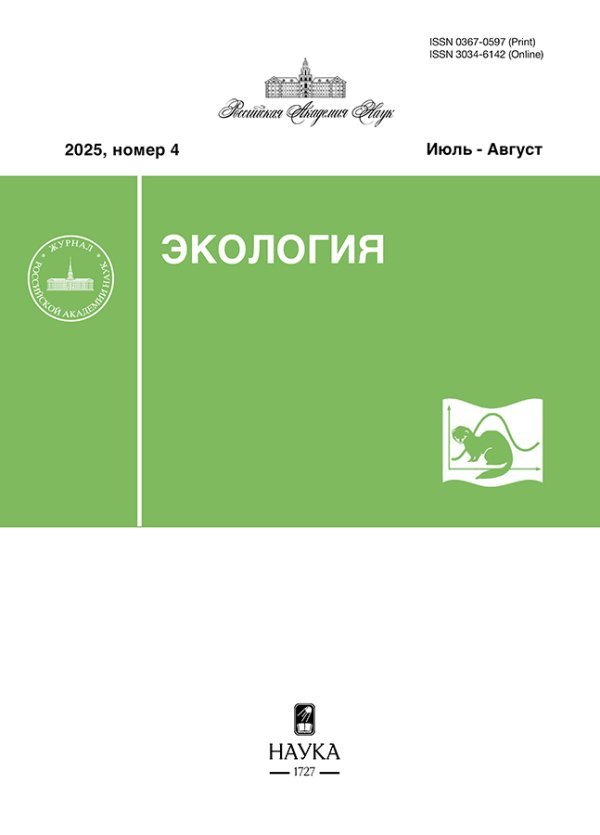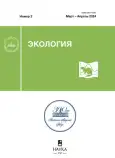Impact of ice rain on forests of Russky Island
- Authors: Ivanov A.V.1, Zamolodchikov D.G.2,3, Kravchenko O.M.3, Soloviev I.D.3
-
Affiliations:
- Institute of Geology and Nature Management, Far Eastern Branch of the Russian Academy of Sciences
- Center for Forest Ecology and Productivity, Russian Academy of Sciences
- National Research University “Higher School of Economics”
- Issue: No 2 (2024)
- Pages: 77-85
- Section: Articles
- URL: https://journals.eco-vector.com/0367-0597/article/view/671551
- DOI: https://doi.org/10.31857/S0367059724020014
- EDN: https://elibrary.ru/DLFELE
- ID: 671551
Cite item
Abstract
Hazardous weather events, which are increasing in frequency with global climate change, pose a threat to forest ecosystems over large areas. Heavy and destructive icy rain occurred in the south of Primorye on November 19, 2020. As a result of the breaking of branches and trunks on the territory of Russky Island, which is part of the Vladivostok urban district, 9.4 ± 1.7 m3/ha of dead fallen wood, which amounted to 4.8% of the total stock of stem wood, was produced. More than a third of all trees lost 50% of their crown. Specific losses of crown phytomass, calculated using regional allometric equations, are estimated at 12.2 ± 2.1 t/ha. The species that were most vulnerable to ice rain (Tilia amurensis and Betula dahurica) were represented by the largest trees, with a wide crown and a large proportion of branches in the total biomass. Lower canopy species (Carpinus cordata and Acer mono) were less affected. The share of the fallen stock of the forest stand (in relation to the total stock) was positively related to the height above sea level (R2 = 0.54, p = 0.039), and the average diameter of the stand was significantly correlated with the phytomass of the fallen part of the crowns (R2 = 0.51, p = 0.047). NDVI vegetation index values obtained from MODIS images for the 2020 and 2021 seasons (before and after the disturbance, respectively) differed significantly.
Keywords
Full Text
About the authors
A. V. Ivanov
Institute of Geology and Nature Management, Far Eastern Branch of the Russian Academy of Sciences
Author for correspondence.
Email: aleksandrgg86@mail.ru
Russian Federation, Blagoveshchensk, 675000
D. G. Zamolodchikov
Center for Forest Ecology and Productivity, Russian Academy of Sciences; National Research University “Higher School of Economics”
Email: aleksandrgg86@mail.ru
Russian Federation, Moscow, 117234; Moscow, 109028
O. M. Kravchenko
National Research University “Higher School of Economics”
Email: aleksandrgg86@mail.ru
Russian Federation, Moscow, 109028
I. D. Soloviev
National Research University “Higher School of Economics”
Email: aleksandrgg86@mail.ru
Russian Federation, Moscow, 109028
References
- Обзор состояния и загрязнения окружающей среды в Российской Федерации за 2020 год. М.: Росгидромет, 2021. 205 с.
- IPCC, 2013: Climate Change 2013: The Physical Science Basis. Contribution of Working Group I to the Fifth Assessment Report of the Intergovernmental Panel on Climate Change [T.F. Stocker, D. Qin, G.-K. Plattner, M. Tignor, S.K. Allen, J. Boschung, A. Nauels, Y. Xia, V. Bex and P.M. Midgley (eds.). Cambridge: Cambridge University Press, United Kingdom and New York, N.Y., USA, 1535 p.
- Вильфанд Р.М., Голубев А.Д. Метеорологические условия выпадения ледяных дождей 25–26 декабря 2010 г. над центром европейской части России // Лед и снег. 2011. № 3 (115). С. 119–124.
- Bragg D.C., Shelton M.G., Zeide B. Impacts and management implications of ice storms on forests in the southern United States // Forest Ecology and Management. 2003. V. 186 (1–3). P. 99–123. doi: 10.1016/S0378-1127(03)00230-5
- Калинин Н.А., Смородин Б.Л. Редкое явление замерзающего дождя в Пермском крае // Метеорология и гидрология. 2012. № 8. С. 27–35.
- Deschenes E., Brice M.-H., Brisson J. Long-term impact of a major ice storm on tree mortality in an old-growth forest // Forest Ecology and Management. 2019. V. 448. P. 386–394. doi.org/10.1016/j.foreco.2019.06.018
- Марфенина О.Е., Иванова А.Е., Глушакова А.М. и др. Грибные эпифиты древесных растений после “ледяного дождя” // Микология и фитопатология. 2012. Т. 46. № 6. С. 377–384.
- Miller-Weeks M., Eagar C., Petersen C.M. The northeastern ice storm, 1998 : a forest damage assessment for New York, Vermont, New Hampshire, and Maine. N.Y.: North East State Foresters Association, 1999. 32 p.
- Голубев А.Д., Кабак А.М., Никольская Н.А. и др. Ледяной дождь в Москве, Московской области и прилегающих областях центра европейской территории России 25–26 декабря 2010 г. // Тр. Гидрометеорологического научно-исследовательского центра Российской Федерации. 2013. № 349. С. 214–230.
- Ананьева А.Е., Болотин С.Н. Воздействие ледяного дождя в Краснодаре на памятники природы // Курортно-рекреационный комплекс в системе регионального развития: инновационные подходы. 2014. № 1. С. 121–124.
- Леонов И.И., Соколихина Н.Н. Условия формирования ледяного шторма во Владивостоке в ноябре 2020 года // Гидрометеорологические исследования и прогнозы. 2021. № 4 (382). С. 69–83.
- Amatulli G., Domisch S., Tuanmu M.-N. et al. A suite of global, cross-scale topographic variables for environmental and biodiversity modeling // Scientific. 2018. V. 5. № 180040. doi: 10.1038/sdata.2018.40
- Hansen M.C., Potapov P.V., Moore R. et al. High-resolution global maps of 21st-century forest cover change // Science. 2013. V. 342 (6160). P. 850–853. doi.org/10.1126/science.1244693
- Куренцова Г.Э. Естественные и антропогенные смены растительности Приморья и Южного Приамурья. Новосибирск: Наука, 1973. 230 с.
- Справочник для учета лесных ресурсов Дальнего Востока. Отв. сост. и науч. ред. В.Н. Корякин. Хабаровск: ДальНИИЛХ, 2010. 525 с.
- Касаткин А.С., Жанабаева А.С., Акимов Р.Ю. и др. Надземная фитомасса и квалиметрия некоторых древесных пород Южного Сихотэ-Алиня // Эко-потенциал. 2015. № 1 (9). С. 41–50.
- Касаткин А.С., Жанабаева А.С., Иванов А.В. и др. Надземная фитомасса деревьев в лесах Южного Сихотэ-Алиня. Сообщ. 3 // Эко-потенциал. 2016. № 1 (13). С. 32–36.
- Касаткин А.С., Жанабаева А.С., Пауков Д.В. и др. Надземная фитомасса деревьев в лесах Южного Сихотэ-Алиня. Сообщ. 2 // Эко-потенциал. 2015. № 4 (12). С. 28–31.
- Иванов А.В., Касаткин А.С., Мудрак В.П., Замолодчиков Д.Г. Надземная фитомасса древостоев хвойно-широколиственных лесов Южного Приморья // Лесоведение. 2018. № 6. С. 454–463.
- Грабовский В.И., Замолодчиков Д.Г. Модели оценки запасов валежа по данным учетов на трансектах // Лесоведение. 2012. № 2. С. 66–73.
- Иванов А.В., Замолодчиков Д.Г., Лошаков С.Ю. и др. Вклад крупных древесных остатков в биогенный цикл углерода хвойно-широколиственных лесов юга Дальнего Востока России // Лесоведение. 2020. № 4. С. 357–366.
- Черепанов А.С. Вегетационные индексы // Геоматика. 2011. № 2. С. 98–102.
- R Core Team 2021 R. A Lang. Environ. Stat. Comput. R Found. Stat. Comput. 2020.
- Ivanov A.V., Ivanova E.V., Gamaeva S.V. Changes in the diversity of conifer–broadleaf forests of Southern Primorye resulting from selective logging and fires // Russ. Journal of Ecology. 2022. V. 53. № 2. P. 83–90. doi: 10.1134/S1067413622020047
- Irland L.C. Ice storms and forest impacts // The Science of the Total Environment. 2000. V. 262. P. 231–242. doi: 10.1016/S0048-9697(00)00525-8
- Olthof I., King D.J., Lautenschlager R.A. Mapping deciduous forest ice storm damage using Landsat and environmental data // Remote Sensing of Environment. 2004. V. 89. P. 484–496. doi: 10.1016/j.rse.2003.11.010
- Lafon C.W. Forest disturbance by ice storms in Quercus forests of the southern Appalachian Mountains, USA // Ecoscience. 2006. V. 13. P. 30–43. http://doi.org/10.2980/1195-6860(2006)13[30:FDBISI]2.0.CO;2
- Proulx O.J., Greene D.F. The relationship between ice thickness and northern hardwood tree damage during ice storms // Can. J. For. Res. 2001. V. 31. Р. 1758–1767.
- Zhu L., Zhou T., Chen B., Peng S. How does tree age influence damage and recovery in forests impacted by freezing rain and snow? // Science China Life Sciences. 2015. V. 58. P. 472–479. doi: 10.1007/s11427-014-4722-2
- Stueve K.M., Lafon C.W., Isaacs R.E. Spatial patterns of ice storm disturbance on a forested landscape in the Appalachian Mountains, Virginia // Area. 2007. V. 39. P. 20–30. doi: 10.1111/j.1475-4762.2007.00722.x
- Duguay S.M., Arii K., Hooper M. et al. Ice storm damage and early recovery in an old-growth forest // Environ Monit. and Assess. 2001. V. 67. P. 97–108. doi.org/10.1023/A:1006464511158
- Unay-Gailhard I., Bojnec S. Public support effect on natural disaster management: A case study of ice storms in forests in Slovenia // Land Use Policy. 2020. V. 95. P. 1–13. doi: 10.1016/j.landusepol.2019.01.014
- Nock C.A., Lecigne B., Taugourdeau O. et al. Linking ice accretion and crown structure: towards a model of the effect of freezing rain on tree canopies // Annals of Botany. 2016. V. 117. P. 1163–73. doi: 10.1093/aob/mcw059
- Millward A.A., Kraft C.E. Physical influences of landscape on a large-extent ecological disturbance: the northeastern North American ice storm of 1998 // Landscape Ecology. 2004. V. 19. P. 99–111.
- Dziziurova V.D., Korznikov K.A., Petrenko T.Y. et al. Assessment of the mixed coniferousbroadleaved forest canopy disturbance induced by typhoon Maysak (2020) using drone-borne images near Vladivostok, Russia // Botanica Pacifica: a Journal of Plant Science and Conservation. 2022. V. 11. № 2. С. 81–87.
- Shortle W.C., Smith K.T., Dudzik K.R. Tree Survival and Growth Following Ice Storm Injury. Res. Pap. NE-723. Newtown Squre, PA: U.S. Department of Agriculture, Forest Service, Northeastern Research Station, 2003. 4 p.
Supplementary files














